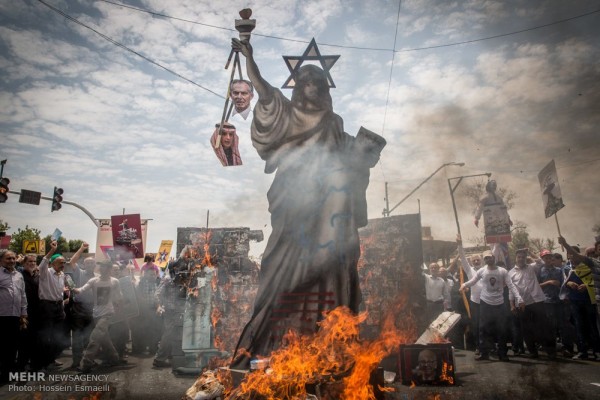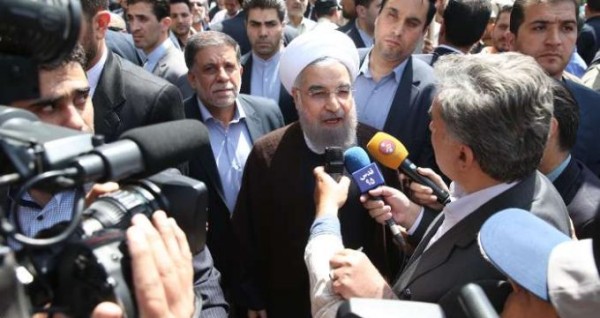PHOTO: President Rouhani speaks to reporters during the Quds Day march in Tehran
LATEST
Iran’s regime staged its annual show for Quds (Jerusalem) Day on Friday, with the standard proclamations denouncing Israel and proclaiming solidarity with the Palestinian people but also pointing to Tehran’s concerns in Iraq and Syria.
As large crowds marched in Tehran and other cities, the occasion was distinguished by the tough rhetoric of President Rouhani, who has not been as strident in anti-Israeli rhetoric.
Rouhani declared that the Palestinian nation “will never remain alone and it will certainly achieve victory in the wake of resistance”.
He then connected that line with Iran’s concerns — and involvement — in regional crises such as the Syrian civil war and the fight against the Islamic State in Iraq:
We have been distanced from the path of freedom for Palestine, under the shadow of disunity in the Islamic world and the presence of terrorist takfiri groups in the region….The [Iranian] people will stand with the world’s oppressed and next to the oppressed people of Palestine.
Foreign Minister Mohammad Javad Zarif also struck a tough pose, calling Israel and “terrorist” groups a “single danger”: “The takfiris and their supporters have forgotten the reality of Israel’s hostility with the Muslim world.”

Marchers burn Lady Liberty, with a Star of David crown and holding images of former British Prime Minister Tony Blair and Saudi Foreign Minister Adel al-Jubeir
“100,000 Missiles Ready for Israel”
The Deputy Commander of the Revolutionary Guards, Brigadier General Hossein Salami, gave the most dramatic statement, claiming that “in Lebanon alone, there are 100,000 missiles ready to be launched”.
Speaking before Tehran Friday Prayers, the general declared that missiles throughout the Islamic world were ready to “wipe out one malevolent and black spot from the political geography forever”.
Salami also spoke about recent clashes between the Guards and Kurdish insurgents in northwest Iran, claiming that the problem lay in sanctuary for the Kurds across the border:
I warn officials in northern Iraq to abide by their commitments….We will destroy any threat against the Islamic Republic’s [political] system without any hesitation.
The Iranian military has said that it will target “terrorists’ primary bases” in northern Iraq if the Iraqis do not secure the area.
The commander of Iran’s ground forces, Brigadier General Ahmad Reza Pourdastan, said the high turnout at the rallies showed that “the Supreme Leader’s message that Israel will not exist in 25 years” will become a reality.
“S-300 Missiles Ready by March”
Brigadier General Farzad Esmaili added yet another declaration that advanced S-300 anti-air missile systems will finally be deployed in Iran.
Esmaili said the first S-300 system, provided by Russia, will be operational by the end of this Iranian year in March 2017.
Russia initially signed a contract with Tehran in 2007 to deliver the S-300s, but the deal was suspended in 2010 amid US and Israeli pressure on Moscow. President Vladimir Putin lifted the suspension in spring 2015, and the first S-300 components were finally displayed during a military parade in March.
Texts to Journalists and Activists “This is Your Last Warning”
Journalists, activists, and family members of political prisoners have been receiving threatening text messages since Wednesday:
Warning: Any communication or cooperation with hostile elements outside the country through email, secure portals and other means of communication is a crime and will be prosecuted. It is necessary to stop communicating. Consider this your last security warning.
The source of the message, which comes from a private number, is unclear.
One journalist replied to the message, “You are?” The response was “This is your last warning. Our next step is taking action”, with original text re-sent.
Another journalist noted similar harassment just before the February 2016 Parliamentary elections, with hacking of e-mail and social media accounts and phishing messages from intelligence and security agencies.
The Revolutionary Guards have cracked down on journalists and activists since last autumn, carrying out a series of detentions.

